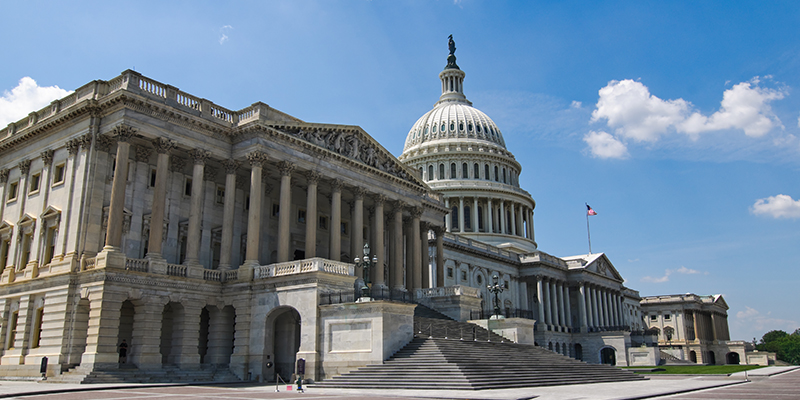Even by Washington’s standards, the level of political theater surrounding President Joe Biden’s domestic agenda on infrastructure, climate and expansion of government social spending programs has been extraordinary. The same can be said about the ongoing debate over raising the nation’s debt ceiling, with even more serious implications for the global economy if Congress fails to suspend or increase it. October promises to inject some realism into the ongoing dramas, however, with hard dates for resolution of these issues.
As soon as Biden unveiled his “Build Back Better” agenda earlier this year, which proposed trillions in new spending for infrastructure (the American Jobs Plan) and for a historic expansion of government social programs that he labeled “human infrastructure” (the American Families Plan), financed with tax increases on higher-income taxpayers and businesses, it was patently obvious that Senate Republicans would not be on board.
For one, Republicans were not buying the “human infrastructure” tag, maintaining that infrastructure meant roads, bridges, airports and ports, and other “physical infrastructure,” and did not include child-care support, universal preschool, free community college, and other social spending elements of the Biden agenda. Secondly, Republicans were not going to overturn portions their most recent signature domestic policy achievement, the 2017 Tax Cuts and Jobs Act, by voting for higher taxes.
The expansion of social safety net programs and tax increases would have to be passed using “budget reconciliation”, a procedural measure that is exempt from the filibuster rules of the Senate that require 60 votes to advance a bill. A reconciliation measure could be passed with only a simple majority. With 50 Democrats in the Senate, and with the U.S. Constitution providing that the vice president breaks a tie, Democrats could get a social spending and tax bill through the Senate on a purely partisan basis, relegating Republicans to the sidelines. But this would require the agreement of all Senate Democrats.
Biden still wanted to show he could be bipartisan, which was one of the characteristics he touted during his presidential campaign. For their part, Republicans did truly support increased infrastructure investment in physical assets and wanted to prove they were not simply obstructionists. The result was a $1.2 trillion-dollar bipartisan infrastructure deal that passed the Senate with 19 Republicans supporting the measure.
At this time, the normal political theatrics were taken up a notch. Prior to its passage, progressive Democrats in the House angrily expressed disappointment with the Senate’s infrastructure deal, vowing they would not support it unless moderate Democrats supported the larger $3.5 trillion dollar reconciliation package, essentially linking the two bills. Speaker Nancy Pelosi and Senate Majority Leader Chuck Schumer agreed. This almost upended the deal in the senate as Republicans now wondered what they were actually voting to advance: the $1.2 infrastructure alone, or were they voting to advance both bills? During a press conference, Biden complicated matters by first appeasing progressives and saying that both bills would move in tandem, and then having to walk back those comments the next day saying he would sign the infrastructure deal independently of the reconciliation bill.
Thus did Biden pretend that both bills were not linked, and Senate Republicans who wanted to vote for infrastructure pretended to believe him, betting that moderate Democrats in the Senate would make passing the $3.5 trillion reconciliation measure difficult. Democratic Senators Joe Manchin (D-WV) and Kyrsten Sinema (D-AZ) – both centrists and key figures in the Senate passage of the infrastructure bill – made it very clear to Senate Democratic leadership that they would not support some elements of the president’s proposed spending and tax plans, with Manchin saying his top amount was $1.5 trillion. For their part, House progressives continued to act as if they were living in their own magic kingdom, saying that they would not vote for anything under $3.5 trillion despite needing unanimity among Senate Democrats. Meanwhile, moderate House Democrats forced Pelosi to promise a vote on the infrastructure bill by Sept. 27, regardless of where they were on the reconciliation bill.
The September drama closed with Biden addressing the warring factions of the Democratic party: he sided with progressives, saying both the infrastructure and social spending bills were linked and telling moderates that they would not get their promised vote, and he told progressives that they would need to settle for much less than $3.5 trillion. Democrats are now hurriedly engaged in the nitty-gritty policy negotiations needed to compromise on the larger spending package – a process that should have started months ago. They are realizing they must dial down some of the tax increases to get Senate passage.
If the fighting between Democratic party factions over the reconciliation bill ultimately ended up being political theater, the debate between Senate Republicans and Democrats on the debt ceiling should qualify as theater of the absurd. Nobody believes that the United States should default on its obligations, and the Treasury Department warned Congress that they would run out of borrowing authority on or about Oct. 18 unless the debt ceiling is raised or suspended.
The truth? Senate Democrats can do this completely on their own through a reconciliation bill, but don’t want to give Republicans an issue to campaign on in next year’s elections. Republicans, having heard Democrats say they are passing the reconciliation bill without their input, are telling Democrats to do the same on the debt ceiling. Both sides agree on what ultimately should be done (lift or suspend the debt limit) and both are playing a game of chicken with the full faith and credit of the United States at risk. There is even a hint of Greek tragedy, with a trillion-dollar platinum coin scheme being floated as a cure all like a deus ex machina – a god coming to the rescue at the end of the play to fix an impossible situation.
Expect the finger-pointing and histrionics to continue on this issue for a while longer, but a U.S. default on its debt obligations and the disastrous implications for the global economy will become very real to those in the Senate who will also need to worry about miscalculating in their brinksmanship.














